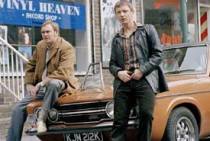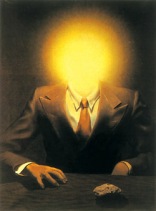Lyn Gardner continues to be instinctively right, it seems to me, in her latest guardian blog about small-scale shows, even if I’m not sure she commits fully to her argument.
I also saw Internal at BAC during Burst – it’s a piece for five audience (and five performers) that begins with parallel one-on-ones before opening out into a circle of ten. It certainly raises the stakes for the audience. When I came out of the performance I was thrilled and adrenalised.
Lyn was savvy enough to lie to the Belgians. I foolishly felt for them and opened up, assuming that the success of the show would depend on our genuine and honest participation. More fool me, it seems. By halfway through, it’s clear that your partner-performer isn’t engaging equally with the audience member. They’re playing a part, revealing nothing – and then they began to hold the information I’d given over me, releasing some of it as entertainment for the other audience members. Betrayal. The thrill of the show, I realised later, was fear and a bit of self-disgust. I was in jeopardy.
isn’t engaging equally with the audience member. They’re playing a part, revealing nothing – and then they began to hold the information I’d given over me, releasing some of it as entertainment for the other audience members. Betrayal. The thrill of the show, I realised later, was fear and a bit of self-disgust. I was in jeopardy.
It seems to me that a successful intimate performance is about trust – and liberating the audience member to feel supported enough to express themselves and behave unselfconsciously. Performers forget how difficult and exposing this is for normal people. The Ontroerend Goed performers seemed to enjoy betraying this trust. Now, you could argue that they provoked a strong response, and that by conjuring one, they had done more than Fat Pig or Marguerite are likely to manage. But I found it reminiscent of those shabby, cowardly reality TV/comedy programmes where unsuspecting members of the public are ridiculed by Dom Joly or Marc Wootton. The performers, prepared and rehearsed, run no personal risk. The victims have no chance – they’re damned if they believe. It’s a culture that rewards deceit and defensiveness, and punishes openness and trust. And it doesn’t even do what an impactful stage performance does, where an actor’s emotional nakedness and commitment in enacting a fiction can humble an audience, sometimes into their own tears. Lots of intimate shows seem to be cooked up by theatre-makers who are focused only on making the experience more intense for an audience. I didn’t have the chance to experience Ontroerend Goed’s (more lauded) one-person show The Smile Off Your Face – it sounds like it handled the trust relationship more sensitively. But there’s more to experience than intensity.
Let me know if you’ve been to any intimate performances that allowed you to feel safe and able to respond openly.
 Meanwhile I was lucky enough to catch one of the performances of the Red Ladies at the ICA, and it seemed to me again that Suzy Willson is among our most under-rated and consistently extraordinary theatre-makers. Flashier, more marketing-minded companies like Punchdrunk and Shunt pick up the coverage, but her work with composer Paul Clark as the Clod Ensemble is both more interesting and more consistent. She’s understated and it’s often a long time between shows – but what shows. The thrillingly simple and minimal Silver Swan up in Edinburgh a few years ago. And the development of Red Ladies over the last couple of years has been about the only serious contribution to a debate people sometimes try to have about Public Theatre. There was an event about this at the Tricycle a few years back, but the Red Room railroaded it into being about political theatre, which is a very different (and less amazing) thing. I’m constantly seeing political theatre, and it’s just the same as (supposedly) non-political theatre: someone banging on about their point of view and why it’s right. Public theatre is something quite different and again, like the successful intimate theatre, it’s respect for the consideration of the audience that makes it work. The Red Ladies work excitingly and provocatively as a street theatre intervention, and in the theatre show they unfold layer after layer of meaning, making a seamless transition between theatre, movement and music. Willson’s talking about protest, about group identities, and about women, and she’s a wonderfully assured and witty guide. The non-narrative structure of Red Ladies – it’s structured like a piece of music – allows the audience to wander around the themes. the beautifully individualised chorus movement makes sure you never need to be bored. And whenever it threatens to veer
Meanwhile I was lucky enough to catch one of the performances of the Red Ladies at the ICA, and it seemed to me again that Suzy Willson is among our most under-rated and consistently extraordinary theatre-makers. Flashier, more marketing-minded companies like Punchdrunk and Shunt pick up the coverage, but her work with composer Paul Clark as the Clod Ensemble is both more interesting and more consistent. She’s understated and it’s often a long time between shows – but what shows. The thrillingly simple and minimal Silver Swan up in Edinburgh a few years ago. And the development of Red Ladies over the last couple of years has been about the only serious contribution to a debate people sometimes try to have about Public Theatre. There was an event about this at the Tricycle a few years back, but the Red Room railroaded it into being about political theatre, which is a very different (and less amazing) thing. I’m constantly seeing political theatre, and it’s just the same as (supposedly) non-political theatre: someone banging on about their point of view and why it’s right. Public theatre is something quite different and again, like the successful intimate theatre, it’s respect for the consideration of the audience that makes it work. The Red Ladies work excitingly and provocatively as a street theatre intervention, and in the theatre show they unfold layer after layer of meaning, making a seamless transition between theatre, movement and music. Willson’s talking about protest, about group identities, and about women, and she’s a wonderfully assured and witty guide. The non-narrative structure of Red Ladies – it’s structured like a piece of music – allows the audience to wander around the themes. the beautifully individualised chorus movement makes sure you never need to be bored. And whenever it threatens to veer into taking itself too seriously, there’s a moment of beauty, droll self-knowledge or fierce energy to shift your preconceptions. As Lady 3 says at the beginning: “Whatever you think we are.. We’re not that.” It seems to me to be totally public. Everything about it celebrates the individual in the crowd – both as herself and as someone in a society. It champions some specific values, sure enough, but it explicitly articulates those values by showing you variations (and sometimes abstentions) from them. Consensual, complex, grown-up politics, not soapbox posturing. What’s inconceivable is that it does 3 performances on wet spring weekdays. Is that all the appetite our city has for this kind of work?
into taking itself too seriously, there’s a moment of beauty, droll self-knowledge or fierce energy to shift your preconceptions. As Lady 3 says at the beginning: “Whatever you think we are.. We’re not that.” It seems to me to be totally public. Everything about it celebrates the individual in the crowd – both as herself and as someone in a society. It champions some specific values, sure enough, but it explicitly articulates those values by showing you variations (and sometimes abstentions) from them. Consensual, complex, grown-up politics, not soapbox posturing. What’s inconceivable is that it does 3 performances on wet spring weekdays. Is that all the appetite our city has for this kind of work?
Breath bated to see if the media decide to shit on or pay attention to Chris Goode‘s experiments at the Gate… I’m going later in the run but I guess it could go either way. Maybe we’ll get one of Billington’s two-column non-reviews explaining what he thinks is the right way to have directed it.
Incidentally, I noticed that Lyn’s piece about intimate shows received almost no comments (I’m sure this will have fewer). I assume that’s because these tiny shows are self-evidently peripheral to the real theatre that everyone sees – and who cares if a few tossers in London see some pretentious art shows? This may be true (and it’s certainly the case that lots of emerging ‘artists’ make work for a disappointingly homogeneous audience) but I hope the relation to the Red Ladies (and onwards perhaps) suggests how the aesthetic values people pioneer in these experiments will underpin all their subsequent work. If you start out despising the audience, what hope have you got when you’re generating product?








